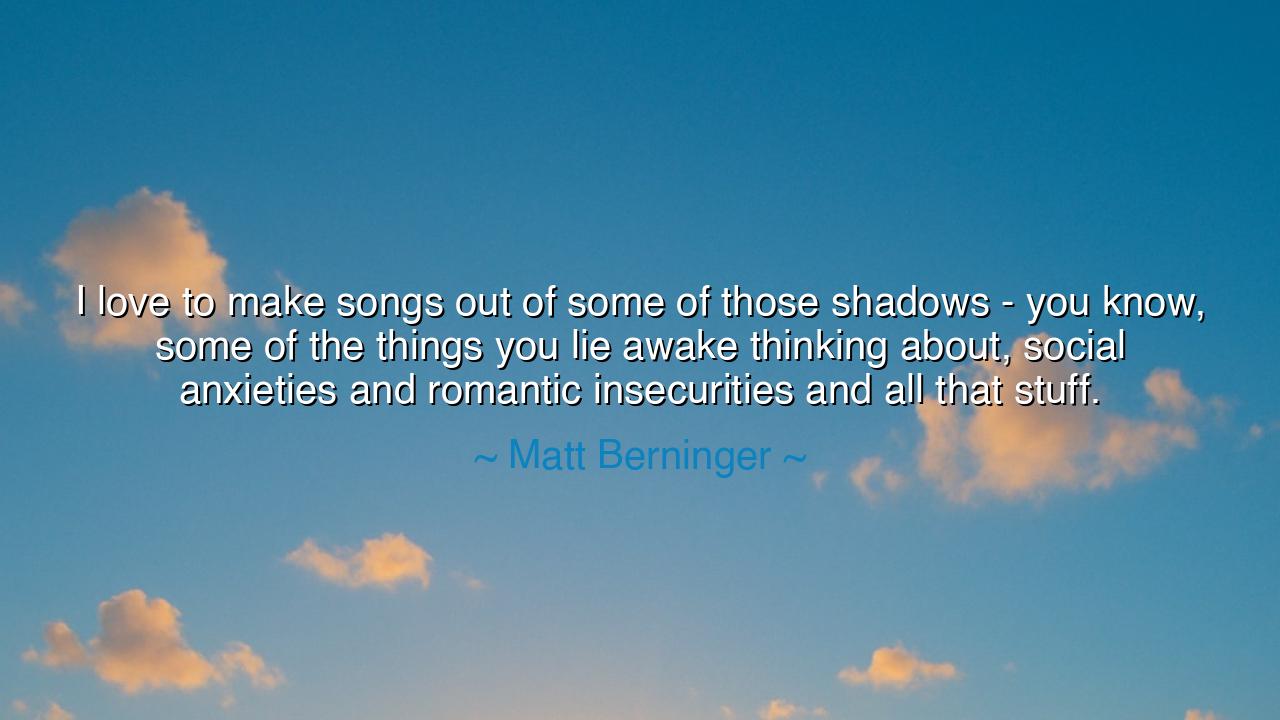
I love to make songs out of some of those shadows - you know
I love to make songs out of some of those shadows - you know, some of the things you lie awake thinking about, social anxieties and romantic insecurities and all that stuff.






The words of Matt Berninger—“I love to make songs out of some of those shadows—you know, some of the things you lie awake thinking about, social anxieties and romantic insecurities and all that stuff”—speak with the voice of one who has dared to descend into the valleys of the human soul. He acknowledges the reality of the shadows—those restless thoughts, fears, and uncertainties that haunt us in silence—and transforms them into music. What others might hide or bury, he chooses to expose, to weave into melody and lyric, so that the darkness itself becomes luminous.
The origin of this vision lies in the eternal task of the poet and the artist. Since ancient times, those gifted with words and song have been the interpreters of human weakness and longing. The psalmists of Israel cried out their insecurities before God. The Greek tragedians staged the anxieties of fate, love, and mortality for all to witness. The Romantic poets of the nineteenth century spoke of their doubts, sorrows, and yearnings in verses that still stir the heart. Berninger continues this lineage: he takes social anxieties and romantic insecurities, the quiet struggles that modern life magnifies, and turns them into shared art, into something that consoles and connects.
History offers us an example in the life of Franz Kafka, who wrote of his own fears, alienation, and insecurities in a world that seemed oppressive and incomprehensible. His works, though born of deep personal shadows, became universal mirrors of human existence. Though Kafka himself struggled in obscurity, his writings resonated across generations, showing that by giving form to the shadows within, one speaks to the hidden struggles of countless others. Berninger’s songs function in this same way: they remind listeners that they are not alone in their sleeplessness, not isolated in their doubts.
What Berninger reveals is that the shadows of the mind are not enemies to be banished, but raw material to be shaped. To deny them is to live shallowly, pretending strength while hiding fragility. But to face them, to name them, and even to turn them into art—that is an act of courage. It is the transformation of weakness into beauty, the alchemy by which pain becomes song and fear becomes connection. This is why listeners feel deeply moved by such music: it is honest, and honesty has power.
The lesson is profound: we must not fear our own insecurities. Romantic fears, social anxieties, the doubts that keep us awake—these are not proof of weakness but proof of humanity. They show that we care, that we long, that we feel deeply. To silence them is to deny part of ourselves, but to give them voice—through art, conversation, reflection—is to free ourselves and to free others who share the same silent burdens.
Practically, this means finding ways to express the shadows. Not all are songwriters, but each can turn their anxieties into words in a journal, into brushstrokes on a canvas, into honest conversations with those they trust. By naming the shadow, we rob it of its power. By sharing it, we transform isolation into communion. The artist teaches us that the shadows, once expressed, can carry beauty and even healing.
Thus, Berninger’s words are not merely about songwriting—they are about the human condition. We are creatures of light and shadow, of joy and fear, of strength and insecurity. The artist’s task, and indeed the human task, is not to deny either side, but to bring them into harmony. To make songs from shadows is to turn pain into beauty, and to remind others that they, too, are part of the same human story.
And so let this truth be passed down: do not despise your shadows. Gather them, honor them, and transform them into expression. For in them lies the possibility of art, of connection, of healing. The sleepless night can give birth to the song that comforts another soul. And in this, the shadow is revealed to be not only darkness, but the soil from which light itself can grow.






AAdministratorAdministrator
Welcome, honored guests. Please leave a comment, we will respond soon